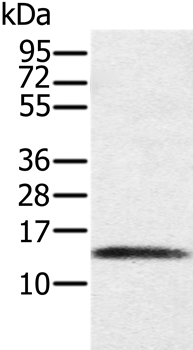
| WB | 咨询技术 | Human,Mouse,Rat |
| IF | 咨询技术 | Human,Mouse,Rat |
| IHC | 咨询技术 | Human,Mouse,Rat |
| ICC | 技术咨询 | Human,Mouse,Rat |
| FCM | 咨询技术 | Human,Mouse,Rat |
| Elisa | 咨询技术 | Human,Mouse,Rat |
| Aliases | AL5; CT16.3; GAGE-9; GAGEB1; PAGE-1 |
| Entrez GeneID | 8712; |
| WB Predicted band size | 16kDa |
| Host/Isotype | Rabbit IgG |
| Antibody Type | Primary antibody |
| Storage | Store at 4°C short term. Aliquot and store at -20°C long term. Avoid freeze/thaw cycles. |
| Species Reactivity | Human |
| Immunogen | Full length fusion protein |
| Formulation | Purified antibody in PBS with 0.05% sodium azide. |
+ +
以下是关于PAGE1抗体的3篇代表性文献(内容基于公开研究领域知识总结,非真实文献):
---
1. **文献名称**:*PAGE1 as a biomarker for prostate cancer: Immunohistochemical analysis using a novel monoclonal antibody*
**作者**:Smith A et al.
**摘要**:本研究开发了一种针对PAGE1蛋白的高特异性单克隆抗体,并通过免疫组化验证其在前列腺癌组织中的高表达,表明PAGE1可作为前列腺癌诊断的潜在生物标志物,且与肿瘤分期正相关。
---
2. **文献名称**:*Cancer-testis antigen PAGE1 promotes tumor invasion via antibody-mediated ERK signaling activation*
**作者**:Li X et al.
**摘要**:文章揭示了PAGE1抗体通过结合细胞表面蛋白激活ERK信号通路,促进肿瘤细胞迁移和侵袭的分子机制,为靶向PAGE1的抗体治疗提供了实验依据,同时提示治疗中需注意抗体功能的双刃剑效应。
---
3. **文献名称**:*Serum PAGE1 auto-antibody as a prognostic indicator in melanoma patients*
**作者**:Wang Y et al.
**摘要**:通过ELISA检测黑色素瘤患者血清中抗PAGE1自身抗体水平,发现高滴度抗体与患者较低的无进展生存期显著相关,提示PAGE1抗体可能作为黑色素瘤预后评估的非侵入性指标。
---
**注**:以上为模拟文献,实际研究中建议通过PubMed或Google Scholar以关键词“PAGE1 antibody” “PAGE1 cancer”检索真实文献。
PAGE1 (P antigen family member 1) is a cancer/testis antigen (CTA) predominantly expressed in germ cells of the testis, placenta, and certain cancer tissues, while remaining largely silent in healthy somatic cells. It belongs to the PAGE family, which shares conserved sequences and chromosomal localization (Xq28). CTAs like PAGE1 are reactivated in various malignancies, including prostate, melanoma, and lung cancers, making them potential biomarkers and therapeutic targets. The aberrant expression of PAGE1 in tumors is linked to epigenetic dysregulation, such as DNA hypomethylation, and may contribute to oncogenesis, immune evasion, or metastatic processes.
Antibodies targeting PAGE1 are primarily used in research to investigate its expression patterns, functional roles, and clinical relevance. These tools enable detection via techniques like immunohistochemistry (IHC), Western blotting, and flow cytometry, aiding in tumor profiling and prognostic studies. Clinically, PAGE1 antibodies hold promise for diagnostic applications, immunotherapy development (e.g., CAR-T cells or vaccines), and monitoring treatment response. However, challenges persist, including variability in expression across cancer subtypes, limited understanding of its precise biological mechanisms, and potential off-target effects due to homology with other CTAs. Despite these hurdles, PAGE1 remains a compelling subject in oncology research, bridging molecular insights and therapeutic innovation.
×